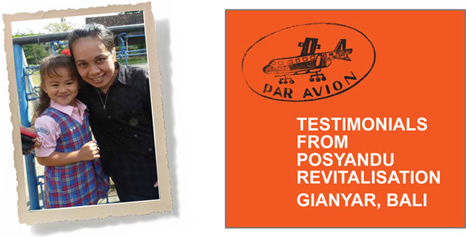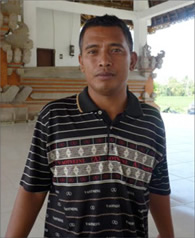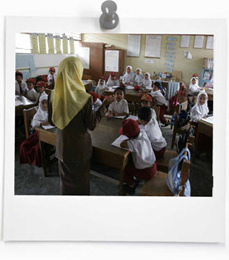

Oka, 40, has been taking her four year old daughter, Thalia to the Singarkerta Taman Posyandu every week day for almost 3 years. Like many other mothers of the children here, she had heard about the reputation of this KSF-supported Taman Posyandu through neighbours. “Unlike other kindergartens in our area, the Singakerta Taman Posyandu has specific classes for different age groups,” Oka explains, “This is what initially attracted me to take Thalia here. I really feel her individual needs are being met by the Posyandu cadres and they have a great understanding of young children’s development.”
Oka has certainly seen the benefits of taking Thalia to a Taman Posyandu such as this one. Oka says “When Thalia first arrived she was very shy and scared of going to class. I would have to stay with her outside the classroom to keep her company and reassure her anxiety. Since coming here, Thalia has become more outgoing and independent. Now, she asks to be left alone in class so she can focus on learning!”
“I don’t pressure her at home to study. I trust that the cadres are nurturing her development and I have seen their wonderful and creative teaching methods, such as using playdough to help Thalia hold her pen and learn how to write!” Every year, KSF provides training, review meetings and refresher courses for the cadres at Singakerta Taman Posyandu to continually improve their knowledge of early childhood development. Oka concludes, “There is certainly a different quality to the cadres here and I am confident that when Thalia starts primary school, she won’t have any problems.”


Dewa Ketut Merta, 34, has two children that attend the Singakerta Taman Posyandu; 5 year old son Dewa Putu Surya Abista, and 3 year old daughter, Desak Made Sri Wahyumi. “I brought my children here for the health services that the Posyandu provided; it’s an easy and accessible way of getting my children registered, immunized and their health monitored – an essential part of childcare that some parents take for granted and others don’t have the opportunity to provide for their children.”
“It’s not just their health monitoring that’s important but it’s fantastic that the Taman Posyandu provides my children with nutritious meals every time they come here, such as milk, rice porridge, eggs, lentils and beans. The cadres’ counseling has made me much more knowledgeable on my children’s nutritional needs and it’s comforting to know that my wife and I have a place to go for advice and support.”

“Since KSF began its programme at our school, I have seen a tremendous change in my teachers. The training they have received from KSF and its local facilitators has allowed them to re-gain their confidence and love of teaching. They tell me that they are motivated by the independence and freedom they have to teach.”
Indeed, walking around the classrooms it is immediate that this school is not the average Indonesian primary school. Students sit in groups around tables and work together and teachers can be found in and amongst clusters of children, eager to present their individual work. No longer do you see lines of tables directed at the front of the class where the teacher is dictating and lecturing the work. Rather, problems are presented to students who are encouraged to think critically, independently and in groups. Mr Sulandri explains, “The children have all grown in confidence and this is also noticed by their parents at home who have seen the positive changes and if they weren’t before, are even more enthusiastic about sending their children to our school. The support from parents and wider community is so valuable not only to the morale of the teachers but also to the attitudes of children coming in to school as they are encouraged by their parents to understand the importance of an education and more importantly, to enjoy it.”
Mr Sulandri exclaims, “I am so proud of the achievements of our school, our teachers and our students, thanks to the support of KSF. 100% of the children who enroll here in the first year of primary school graduate in their sixth year and 90% of our Grade 6 class are accepted into state junior secondary schools, as opposed to an average of 60% prior to SBM.” Given that state schools have a higher standard of education and only accept the more academically accomplished students, this is a true sign of the success of SBM.
The achievements of SBM in this school are such that schools in the surrounding area use SD No.3 as the example to follow and the local government has already begun to replicate the SBM model in all primary schools in the Gianyar district of Bali.
11 year old Ina stands up and announces the arrival of KSF visitors to the rest of her Science class who greet us in the traditional Balinese, “Om swastiastu” (“Peace and Greetings from God.”) Ina is the Class Leader this month; one of several leadership positions that each student take on a rotational basis. Speaking with confidence and self-awareness, Ina shares her experience of going to a primary school that employs SBM.
Like other SBM schools, Ina sits around a table in a group with 2 or 3 of her peers. She says, “Classes are so much more fun now that I spend it working together with my friends and we all help each other with the work. We also change seats so I get to work with everyone and learn from all my different friends.” In addition to enabling children to learn independently and explore creatively, the SBM programme also ensures children develop their social and team working skills.
Looking around, it is not hard to see why Ina enjoys school here. The school’s mission to “Be a School of the Highest Quality” is placed at the entrance, students’ work is proudly displayed on walls around classrooms and multitudes of educational visual tools can be seen that are used to stimulate students’ independent critical thinking.
This has undoubtedly made an impression on all of the students at SD 3, least of all Ina, who reveals that her favourite subjects are Science and Maths and that her ambition is to grow up to be a doctor.

